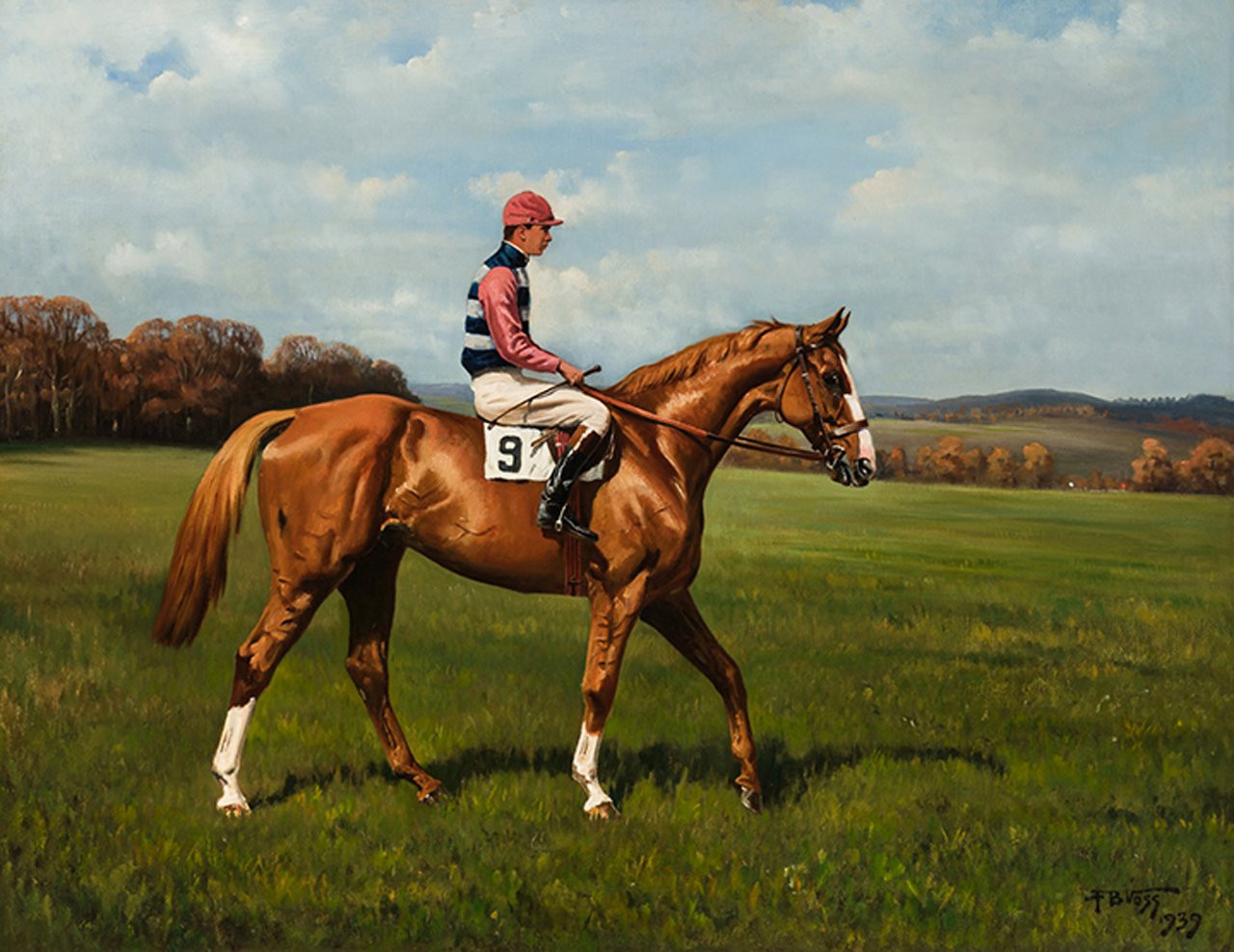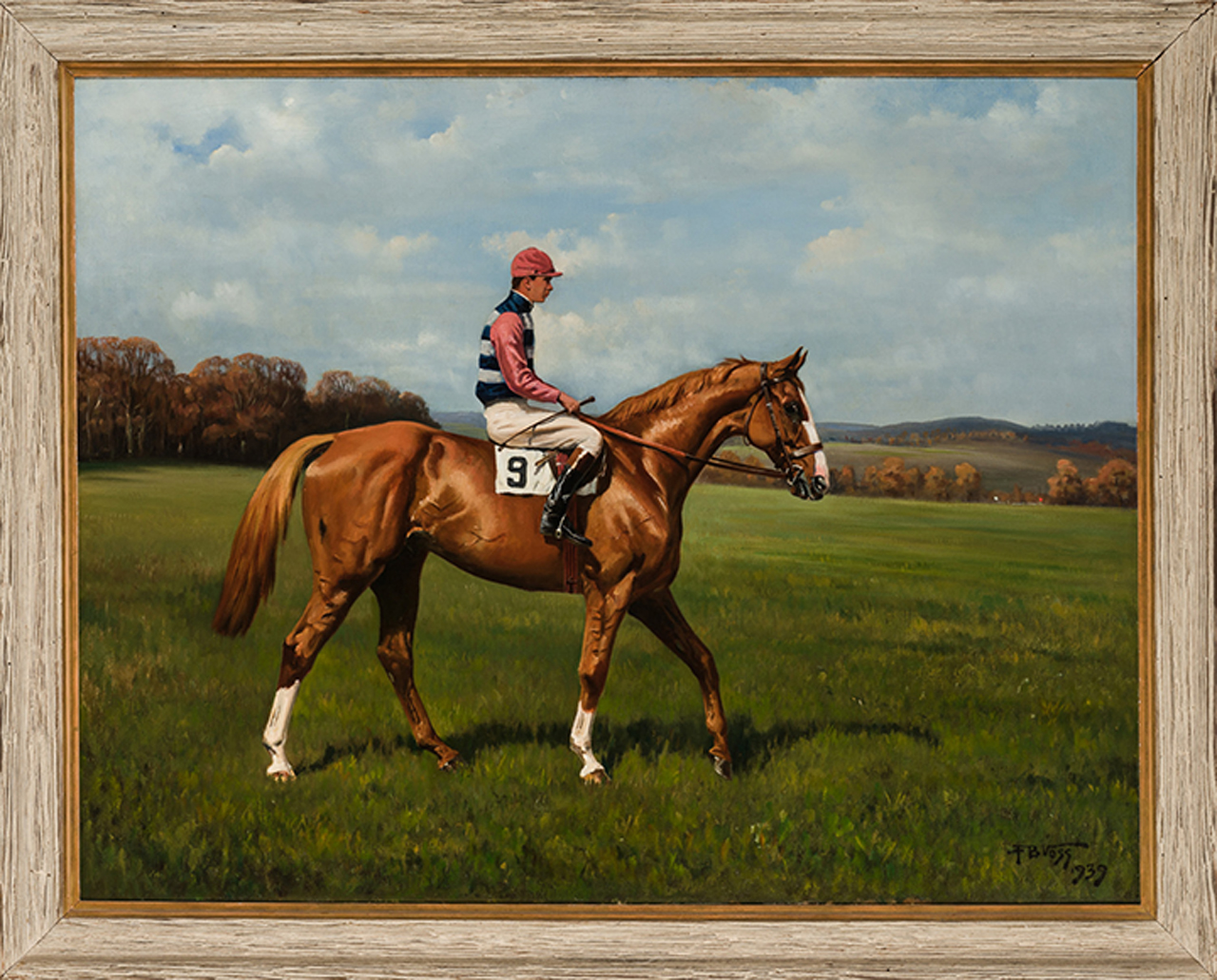2020 Fine Sporting Art, American Paintings, and Sculpture
53| Franklin Brooke Voss (American, 1880-1953)
Peacock With Anderson Fowler Up
Signed, dated 1939 Provenance: Commissioned by Anderson Fowler, 1939; Thence by descent; Estate of Elizabeth “Binnie” Houghton Illustrated: Peter Winants, The Sporting Art of Franklin B. Voss, 2005. p. 79 Exhibited: The Voss Family: Artists of American Sporting Life, National Museum of Racing and Hall of Fame, Saratoga Springs, New York, July 2007-January 2008 (Illustrated in catalogue)Anderson Fowler was a lifelong horseman and sporting enthusiast. At Princeton, he is remembered as a character who played polo, rode in amateur jump races, and played an excellent hand of bridge. In a 1988 interview in The Blood- Horse, Fowler humbly said, I’m afraid that I didn’t get much accomplished as a student because I was always involved in hunt meets and other sporting activities. Despite this statement, he went on to accomplish many things.Fowler rode Peacock, the horse pictured here, to victory in hunt meetings up and down the Eastern seaboard in the 1930s. Fowler purchased Peacock from fellow amateur rider, friend, and future brother-in-law Carroll Bassett in the spring of 1933. Several weeks later Fowler, aboard Peacock, lost by a nose to Bassett and Marion du Pont Scott’s legendary Battleship in the Country Club Race Meet at Brookline, Massachusetts. Peacock quickly put this loss behind him and won several more races that year. His win at Far Hills, near Fowler’s home in New Jersey, was described in the New York Times as an easy four-length triumph. Amateur riders such as Fowler and Bassett rode in country hunt meets held on farms instead of racetracks. They formed a tight-knit community that included the Voss family. Foxhunting was often included in a horse’s training, the speed of the chase conditioning horses perfectly to racing over hills and fences. Many horses were hunted during the week and raced, with their owners in the stirrups, at regional hunt meets on weekends.Fowler was a lifelong resident of Gladstone, New Jersey, near Far Hills. He was the master of the Essex Foxhounds, president of the New Jersey Thoroughbred Breeders Association, board member and treasurer of Monmouth Park, and a member of The Jockey Club. He served in the Army in World War II, first instructing horsemanship at Fort Riley, Kansas, where one of his pupils was heavyweight-boxing champion Joe Louis. Fowler later saw action in the Pacific, participating in the landing at Leyte with General Douglas MacArthur. Following the war, he served in the New Jersey legislature for eight years as an assemblyman. (Later he would name one of his homebred winners Assemblyman). Fowler once jokingly said, I ran for practically every office in Somerset County. My only claim to fame in politics was that I never lost an election. Assemblyman was one of many homebred stakes winners. Others include Baitman, Raritan Valley, and Master Speaker. The homebred Green Alligator impressively won the 1991 California Derby and went on to finish fourth in the 1991 Kentucky Derby. Fowler kept his broodmares at Buckingham Farm in Maryland, which was owned and operated by his daughter Binnie and her husband, Eddie.Anderson Fowler died in 1997.
Oil on canvas, 28" x 36"
20000 - 25000
Signed, dated 1939 Provenance: Commissioned by Anderson Fowler, 1939; Thence by descent; Estate of Elizabeth "Binnie" Houghton Illustrated: Peter Winants, The Sporting Art of Franklin B. Voss, 2005. p. 79 Exhibited: The Voss Family: Artists of American Sporting Life, National Museum of Racing and Hall of Fame, Saratoga Springs, New York, July 2007-January 2008 (Illustrated in catalogue)Anderson Fowler was a lifelong horseman and sporting enthusiast. At Princeton, he is remembered as a character who played polo, rode in amateur jump races, and played an excellent hand of bridge. In a 1988 interview in The Blood- Horse, Fowler humbly said, I'm afraid that I didn't get much accomplished as a student because I was always involved in hunt meets and other sporting activities. Despite this statement, he went on to accomplish many things.Fowler rode Peacock, the horse pictured here, to victory in hunt meetings up and down the Eastern seaboard in the 1930s. Fowler purchased Peacock from fellow amateur rider, friend, and future brother-in-law Carroll Bassett in the spring of 1933. Several weeks later Fowler, aboard Peacock, lost by a nose to Bassett and Marion du Pont Scott's legendary Battleship in the Country Club Race Meet at Brookline, Massachusetts. Peacock quickly put this loss behind him and won several more races that year. His win at Far Hills, near Fowler's home in New Jersey, was described in the New York Times as an easy four-length triumph. Amateur riders such as Fowler and Bassett rode in country hunt meets held on farms instead of racetracks. They formed a tight-knit community that included the Voss family. Foxhunting was often included in a horse's training, the speed of the chase conditioning horses perfectly to racing over hills and fences. Many horses were hunted during the week and raced, with their owners in the stirrups, at regional hunt meets on weekends.Fowler was a lifelong resident of Gladstone, New Jersey, near Far Hills. He was the master of the Essex Foxhounds, president of the New Jersey Thoroughbred Breeders Association, board member and treasurer of Monmouth Park, and a member of The Jockey Club. He served in the Army in World War II, first instructing horsemanship at Fort Riley, Kansas, where one of his pupils was heavyweight-boxing champion Joe Louis. Fowler later saw action in the Pacific, participating in the landing at Leyte with General Douglas MacArthur. Following the war, he served in the New Jersey legislature for eight years as an assemblyman. (Later he would name one of his homebred winners Assemblyman). Fowler once jokingly said, I ran for practically every office in Somerset County. My only claim to fame in politics was that I never lost an election. Assemblyman was one of many homebred stakes winners. Others include Baitman, Raritan Valley, and Master Speaker. The homebred Green Alligator impressively won the 1991 California Derby and went on to finish fourth in the 1991 Kentucky Derby. Fowler kept his broodmares at Buckingham Farm in Maryland, which was owned and operated by his daughter Binnie and her husband, Eddie.Anderson Fowler died in 1997.
Signed, dated 1939 Provenance: Commissioned by Anderson Fowler, 1939; Thence by descent; Estate of Elizabeth "Binnie" Houghton Illustrated: Peter Winants, The Sporting Art of Franklin B. Voss, 2005. p. 79 Exhibited: The Voss Family: Artists of American Sporting Life, National Museum of Racing and Hall of Fame, Saratoga Springs, New York, July 2007-January 2008 (Illustrated in catalogue)Anderson Fowler was a lifelong horseman and sporting enthusiast. At Princeton, he is remembered as a character who played polo, rode in amateur jump races, and played an excellent hand of bridge. In a 1988 interview in The Blood- Horse, Fowler humbly said, I'm afraid that I didn't get much accomplished as a student because I was always involved in hunt meets and other sporting activities. Despite this statement, he went on to accomplish many things.Fowler rode Peacock, the horse pictured here, to victory in hunt meetings up and down the Eastern seaboard in the 1930s. Fowler purchased Peacock from fellow amateur rider, friend, and future brother-in-law Carroll Bassett in the spring of 1933. Several weeks later Fowler, aboard Peacock, lost by a nose to Bassett and Marion du Pont Scott's legendary Battleship in the Country Club Race Meet at Brookline, Massachusetts. Peacock quickly put this loss behind him and won several more races that year. His win at Far Hills, near Fowler's home in New Jersey, was described in the New York Times as an easy four-length triumph. Amateur riders such as Fowler and Bassett rode in country hunt meets held on farms instead of racetracks. They formed a tight-knit community that included the Voss family. Foxhunting was often included in a horse's training, the speed of the chase conditioning horses perfectly to racing over hills and fences. Many horses were hunted during the week and raced, with their owners in the stirrups, at regional hunt meets on weekends.Fowler was a lifelong resident of Gladstone, New Jersey, near Far Hills. He was the master of the Essex Foxhounds, president of the New Jersey Thoroughbred Breeders Association, board member and treasurer of Monmouth Park, and a member of The Jockey Club. He served in the Army in World War II, first instructing horsemanship at Fort Riley, Kansas, where one of his pupils was heavyweight-boxing champion Joe Louis. Fowler later saw action in the Pacific, participating in the landing at Leyte with General Douglas MacArthur. Following the war, he served in the New Jersey legislature for eight years as an assemblyman. (Later he would name one of his homebred winners Assemblyman). Fowler once jokingly said, I ran for practically every office in Somerset County. My only claim to fame in politics was that I never lost an election. Assemblyman was one of many homebred stakes winners. Others include Baitman, Raritan Valley, and Master Speaker. The homebred Green Alligator impressively won the 1991 California Derby and went on to finish fourth in the 1991 Kentucky Derby. Fowler kept his broodmares at Buckingham Farm in Maryland, which was owned and operated by his daughter Binnie and her husband, Eddie.Anderson Fowler died in 1997.
To Leave An Absentee Bid, Please Enter An Amount Below


